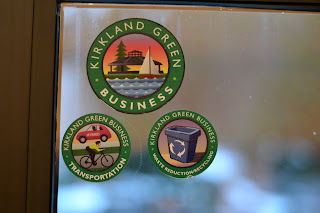Transpo of Kirkland, Washington, is not only planning communities to be more bike-able (and walkable), but are also biking the route and talking the talk in their own day-to-day commuting and business operations.
 |
| Transpo on a cold and rainy day in January |
Located in a less bike-friendly part of Kirkland, a neighborhood of the Totem Lake area, Transpo has still made "biking" a popular commute style amongst coworkers. In fact, they are currently applying for a national accreditation for being a "bicycle friendly business." This will be in addition to having qualified as one of the Kirkland Green Businesses in the categories of "Transportation" and "Waste Reduction and Recycling." The Kirkland Green Business program was started in 2007 and has been active in recruiting more businesses each year. The categories a business can qualify in are: 1. Green Building, 2. Waste Reduction and Recycling, 3. Water Conservation, 4. Energy Efficiency, 5. Transportation, 6. Pollution Prevention, 7. Green Power and/or their newest one: 8. Eastside Green Business Challenge.
Qualifying as a bicycle and transportation friendly place, is no easy feat for a business located in a less connected area of the Eastside. Adam Parast, one of the planners at Transpo explained over the phone last month how they were able to make this happen and increase sustainability in operations and professional services overall! Parast said "Preserving natural spaces and the natural environment while making people's lives better is the natural outcropping of sustainability."
Professionally, Transpo is aiming to add an element of connectivity to each of its projects. Clients range from right here on the Eastside to as far as Abu Dhabi. A current project is making plans to connect the new campus of the Children's Hospital to the existing site. To the type of bike path they are adding, Parast said "it is a high quality bike lane for a high level of separation between bike and auto lanes."
That brings up a good point. Would you be more likely to bike from location to location, knowing you had a safe and enjoyable path to ride on?
If you answered yes, you will be glad to know that Transpo has done some connectivity analysis for Kirkland for upcoming redevelopment. The proposed new BNSF trail that could be coming to the city includes connecting the Totem Lake neighborhood.
 |
| Covered Bike Rack |
You might also be asking, what does it take to make one's operations more sustainable?
Parast filled in with the details of their method of integrating sustainability into their practices. First he mentioned, they have a sustainability committee that meets once a month. Another member of the committee and fellow planner, Patrick Lynch, met me on-site to show what these initiatives look like once they have become part of the day to day operations. "We are trying to stay on top of trends and practices", said Lynch. " We look at it as making the daily operations more efficient by stream-lining things."
What have these "stream-lining" efforts led to?
- Bike Friendly: Employees have access to a covered outdoor bike rack and have space to bring their bikes in the building if they should choose to (especially nice in the colder months.) Once inside there is a bike shower available to clean up after their ride. They have also participated in the Cascade Bike to Work Challenge.
 |
| In office bike shower |
2. Food Scrap Recycling: With the help of the City of Kirkland, Transpo launched this program last quarter. They were surprised how easy it was to integrate this program into their business and gave credit to it partly being a matter of changing people's habits. Parast said "Now coworkers are doing it at their own homes too." If you are wondering if your own business is large enough for this program and want reference, Transpo usually has about 30 people working in the building on a daily basis.
 |
| Patrick Lynch showing the ease of the new food scrap recycling program |
3. Restrict water (single-use) bottle use: Transpo now reserves their single-use bottles for clients only. The employees use the tap and will soon be handed out a reusable water bottle at the next employee meeting.
4. RCM: They have done some observational Resource Conservation Management by monitoring power use and proactively conserving energy by turning the lights off when not in-use.
5. Less Paper Use: Doing more electronically and moving towards having deliverables completely electronic. Having electronic versions also has the benefit of it being an "interactive" form, versus the static hard copies. They also repurpose one-sided printed paper into notepads. Apparently a hot item in the office as they were currently out of them. 

6. Friendly Competitions: Both in-house for bike commuting and recently with another firm for a charity walking challenge.
7. Regular Recycling, Free-cycling and more.
 |
| Office cubicle dedicated to employee "Free-Cycle." Reduce, REUSE, Recycle. |
He also mentioned that non-motorized commute equates to the health benefits to employees/ residents and makes cities more attractive. The end goal of paying more to live in them. This lends to the triple bottom line of sustainability: economic, social and environmental!
 |
| Ride on! |

No comments:
Post a Comment